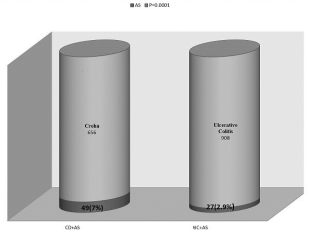Abstract
Background/Aims: The aim of the present study was to compare the demographic features and long-term outcomes of patients with inflammatory bowel disease (IBD) with or without ankylosing spondylitis (AS).
Materials and Methods: Among 1640 IBD (Crohn’s disease and ulcerative colitis), 76 patients with IBD+AS were identified. The study group consisted of 76 patients with IBD with synchronous AS. The control group consisted of patients with only IBD, and those were selected according to their registry sequence number being the previous and next case to the diseased case with IBD+AS. The primary endpoint was to compare the rate of intestinal resections between both groups (IBD vs. IBD+AS).
Results: Among 76 patients with IBD+AS, 52 (68%) first presented with IBD, 11 (15%) with AS, and the remaining 13 (17%) had both diagnoses at the same time. The mean follow-up time was significantly longer in patients with IBD+AS (43.4 vs. 27.8 months; p=0.01). Twenty-two percent of patients with IBD and 14% of those with IBD+AS had an intestinal resection (p=NS). Biologic and systemic corticosteroid treatments were significantly more common among patients with IBD+AS (32% vs. 7% for biologics, p<0.0001 and 44% vs. 28% for corticosteroids, p=0.042). Age-sex-adjusted regression analysis for both groups disclosed IBD duration as the only independent predictor for resection (R2=0.178; p=0.016).
Conclusion: The present study shows that up to 5% of patients with IBD may have AS. Patients with IBD+AS do not have a worse disease outcome than solo patients with IBD.
Cite this article as: Atay K, Eyvazov H, Bozcan S, et al. The effect of concomitant ankylosing spondylitis on long-term outcome of patients with inflammatory bowel disease. Turk J Gastroenterol 2019; 30(7): 599-604.




.png)
.png)
